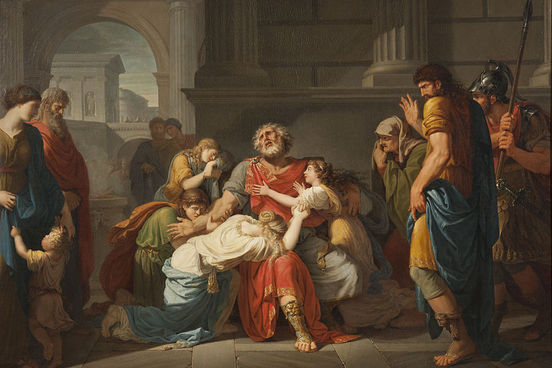
Catastrophe
Definition: the final action that completes the unraveling of the plot in a play, especially a tragedy
The most commonly used sense of catastrophe today is “a terrible disaster.” However, when the word first entered our language in the 16th century, it was as a theatrical term meaning "the conclusion or final event of a dramatic work." Since the catastrophe was most often used in reference to a tragedy, it quickly extended its meaning to be applied to any sort of unhappy ending, and within a few more centuries had come to take on its present sense.
Thus hauing boldly importuned your assistance, and tediously molested your eares with circumstances, leauing now at length to abuse your friendly pacience … and after the Catastrophe of this worldly Comedie, (wherein you play a statelye parte) the gladsome ioyes of the euerlasting Seignorie.
—George Turberuile, Introduction to translation of Ovid’s The Heroycall Epistles of the Learned Poet Publius Ouidius Naso, 1567

Disaster
Definition: an unfavorable aspect of a planet or star
The two earliest senses of disaster began at almost the same exact time (our earliest record of each comes from the middle of the 16th century); the sense of “a great and sudden misfortune” appears to have come slightly after the sense relating to a star. Disaster (which has the Latin word for “star”, astro, in its etymology) is not the only word in English to have been formed based on the supposed influence of stars: the flu is a shortening of influenza, which comes from the Medieval Latin word for “influence,” based on the notion that epidemics were influenced by the stars.
That blount of wyt we feele not now,
How oure Dysastre tournes,
And that we see, and wil not see,
How wayward fortune spornes.
—Thomas Jenny, A Discours of the Present Troobles in Fraunce, 1568

Cataclysm
Definition: a surging flood of water; deluge
The simple definition provided by this dictionary for cataclysm is “something that causes great destruction, violence, etc.” And while the earliest definition may have had to do something with destructiveness, it was in reference to a great flood, rather than some metaphorical wave of change or damage. The word, which began to be used in English in the middle of the 16th century, soon took on its figurative sense of upheaval (the sense that is most common today).
Saynt Hierom writeth, that a Iew shewed him, that it was recorded in certain bookes apochryphal, that 77 soules came of the stock of Lamech, which were destroyed in the floud, and that in this number vegeaūce was takē of Lamech, whose kinred endured vnto the Cataclisme.
—William Ailey, Ptōchomuseion, 1560

Debacle
Definition: a breaking up of ice in a river
Debacle was taken directly from the French débâcle, which is itself from débâcler (“to unbar, unbolt”). It began to be used in English near the end of the 18th century, and was initially used to refer either to the breaking up of ice in a river, or the subsequent rush of water that follows. By 1830, the word had already taken on an extended meaning, as seen in an article in the New York Evening Post: “In an instant a sudden panic seized the troops, a cry was heard that we were cut off, a complete “debacle” followed, the whole army quitting the field in the greatest confusion….”
That the continents have likewise been exposed to similar revolutions; and, in short, that the last great débâcle, or bouleversement, is not, by several centuries, of so remote a date as has been generally supposed.
—Monthly Review, or Literary Journal, Oct., 1795

Meltdown
Definition: the process or course of melting something (as scrap metal or ice cream)
This word is one of the more recent additions to our language from this list, and nicely illustrates that a word needn’t be hundreds of years old before it begins changing its meanings; sometimes this process can occur quite rapidly. Meltdown appears to have begun being used as a noun in the 1930s. Many of the earliest citations we have are using the word in a somewhat technical sense, in the jargon of ice cream manufacturers, to describe the rate at which ice cream returns to a liquid form. By the 1950s meltdown had begun to be used in reference to “the accidental melting of the core of a nuclear reactor,” and now can also refer to any general rapid and disastrous decline.
Color, melt-down and sediment came in for five classifications each ... The dishes were tasted by number and nobody knew whose ice cream he was eating.
—The Courier-Journal (Louisville, KY), 16 Dec., 1938

Tragedy
Definition: a medieval narrative poem or tale, typically describing the downfall of a great man
Some portions of the changes in the meaning of tragedy are rather easy to understand; the word’s initial sense was concerned with a narrative poem (such as Chaucer's Troilus and Criseyde). Since such poems often had endings that were other than happy it is not difficult to see how the word might come to mean “a very bad event.” Less obvious is the etymology of the word, which is thought to be a combination of the Greek word for “he-goat” and a root denoting “singing” (a possible explanation for this is that the tragedies of Ancient Greece were influenced by the Peloponnesian satyr plays, in which the satyrs in question had a goatlike form).
At funeral feestys men synge tragedies With wooful ditees of lamentacioun, In thorpys smale be songe comedies With many uncouth transmutacioun….
—John Lydgate, Minor Poems, c1460

Accident
Definition: any fortuitous or nonessential property, fact, or circumstance
Accident had two meanings in the late 14th century; one of these was closely related to the sense in which it is often found today (“an unforeseen unplanned event or condition”), and the other is rarely encountered outside of philosophy classes. The sense of accident defined above, which deals with attributes, is often found in discussions of Aristotelian thought, as Aristotle used the Greek forerunner of the word in his Metaphysics.
It makes the accidents of Bread and Wine Exist without a subject; that is, there is whiteness and there is moisture, but there is nothing Either white or moist....
—A Dissuasive from Popery Sent in a Letter from A.B. to C.D., 1681





